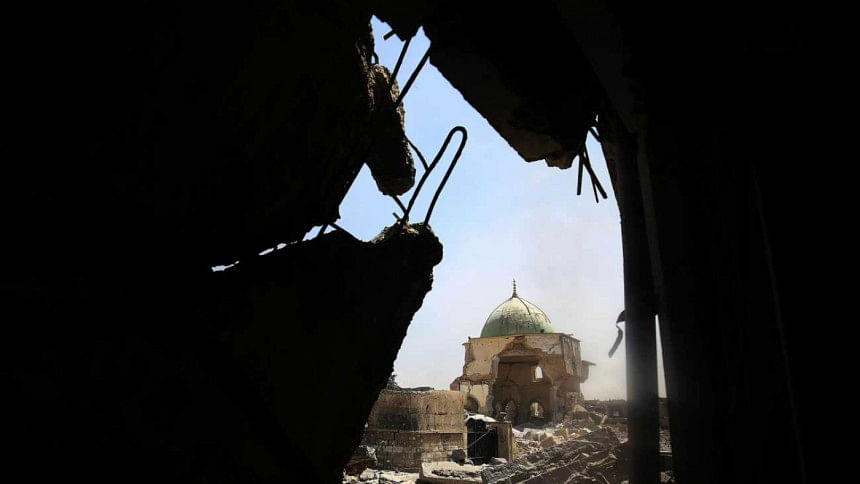Striking a different path to fighting terrorism

On June 21, 2017, Islamic State militants destroyed Mosul's 12th-century al-Nuri mosque and its iconic minaret al-Hadba as Iraq's counter-terrorism units advanced within 164 feet of the structure.
This is hugely symbolic of the IS beating retreat from Mosul. That may effectively have been the curtains for its vestigial territorial hold on Iraq.
"Blowing up of the mosque," said the Iraqi prime minister, "amounted to an official acknowledgement of defeat by Daesh." For, it was from this mosque three years ago the militants' leader Abu Bakr al-Baghdadi had declared a self-styled "caliphate" spanning parts of Syria and Iraq. In fact, he proclaimed himself "caliph" on July 4, 2014 after his followers had overrun vast swathes of Iraq and Syria.
Thus, the IS' territorial existence, though not its ambition, is put in dire straits. Its leadership hierarchy, even if the Russian claim of al-Baghdadi's death in an air strike on Raqqa is confirmed, remains more or less intact, according to reports.
It appears that the more their space shrunk in Syria and Iraq, the more aggressive and brutal became the terror attacks of converted lone wolves and the cells of the terror network in European capitals.
It is being increasingly felt that you cannot be battling an idea or suicidal bomber motivationally and physically wired with a neo-Jihadi killing mission completely out of character with the essence of Islam. Islam literally means peace; moreover, if one refers to the Prophet's (pbuh) Bidai Hajj speech, the totality of benign relations between communities and nations glows in superb radiance.
When such is the humanistic-spiritualist content of Islam, where is the place for enticing the youth to the "blissful embrace of heaven" if they were to die perpetrating a carnage on innocent people?
At this point, you regret the laidback indifference of the top-level Sunni and Shia ulema/clerics across the world (their lack of organisation needing badly to be overcome) to assert and instill the true essence of the religion in its followers.
It is worthwhile to note that whilst the IS, al-Qaeda and Boko Haram have each a command-and-control structure there is no respectable and unified international order at the top. Maybe, there's a semblance of an alliance to fight terrorism through intelligence-sharing but a united international approach in a multilateral sense is sorely missing. This is a contradiction because while launching an intervention they might have forged a common platform but in dealing with its results they fall apart. Another point to note is that their defence budgets are increasing by leaps and bounds but the allocations to fight far-right extremism fail to keep pace with it.
As a matter of fact, given the complexity and ramifications of internal security, it has to be equated with national security.
Actually, each country has to fight its own war against ideological extremism. The West's fight against it is migrant-centric and has to do with deterring European citizens of foreign origins from carrying out terror acts.
Our fight against terrorism is different from that of other countries. Granted, there is need for international and, especially, regional cooperation centring on intelligence-sharing and technical cooperation relating to cyber crimes and financing of terrorist outfits by vested quarters. But the fighting on the ground is essentially contextual.
Let's examine up close how we are doing in our fight against terrorism including, in particular, our counter-terrorism.
Admittedly, the intelligence-driven unearthing of terror dens, caches of weapons, subversive materials, arrest of suspects and killing of assailants have had a deterrent effect on terror attacks that might have been brewing. Nevertheless, the quality of information and their analysis leave much to be desired.
Bangladesh authorities, last year, released the names of 261 men who had gone missing, in an apparent attempt to track them down. At the end of the very list was Jilani alias Abu Zidal. His real name was Ashequr Rahman, an engineering student dropout who travelled to Syria. IS notified him dead in action.
This is cited as an example of a slack in pursuing international links of radical Islamist groups in the country. "A grave error," according to regional experts on militant groups. When, however, the matter was reportedly brought up to the police, they said they went by whatever information the relatives of the missing men gave them.
Banking officials, it is gathered, admit of being "lost when it came to interdicting foreign funding for the attacks."
July 1 (Holey Artisan) and July 7 (Sholakia) militant attacks last year were described as the work of homegrown militants. "There is no IS inside the country,"—although that did not preclude a link to it—was the stock answer. It is claimed, "Many lone wolves and sleeper cell jihadis have pledged support to IS around the world. But their actual link to their command-and-control structure is unclear."
According to critics, our shortcomings are two-fold. First, an unrelenting focus on domestic Islamic militants faced challenges in tracking movements of money and people from abroad. Second, a certain political overtone is discerned in the conduct of anti-terrorism activities.
We seek a new pattern of emphases on checkmating ideological extremism. First, we should become fully objective and professional in our approach. Second, we have to further step up precaution to ward off surprises. And finally, we need to neutralise the vicious doses of motivation by a superior knowledge-based inculcation of values. Let's have de-radicalisation circles all over the country under state and private sector patronisation.
The writer is an analyst of current affairs and former Associate Editor, The Daily Star.
E-mail: [email protected]

 For all latest news, follow The Daily Star's Google News channel.
For all latest news, follow The Daily Star's Google News channel. 



Comments